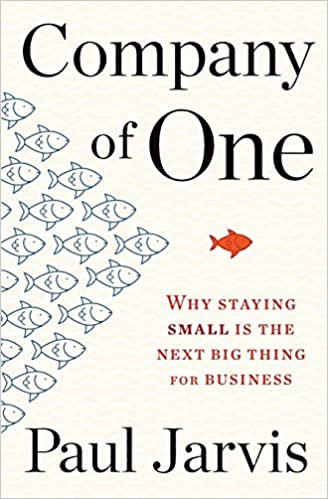Company of One — Book Summary
Introduction
Fresh from the vast mind of Paul Jarvis, a technology and travel-focused individual, is a 2019 publication of Company of One. From his years of experince in launching start-ups, advising businesses, and managing his own passion projects, he writes of all the strategies and tips an up-and-coming individual in any field could benefit from.
Interesting quotes from the book
There’s nothing wrong with finding the right size and then focusing on being better. Small can be a long-term plan, not just a stepping-stone.
— Paul Jarvis, Company of One
There are advantages to putting in the time and effort to master a skill, but there’s also a great need for balance.
— Paul Jarvis, Company of One
In saying no to anything that doesn’t fit, you leave room to say yes to those rare opportunities that do fit—opportunities that align with the values and ideas of your business.
— Paul Jarvis, Company of One
Summary of the book Company of One
The book itself manages to place you in a mindset for advising and building from the ground up based on each section. There are three; " Begin", " Define", and " Maintain." These sections are especially important in each new stage of a growing business, and the key points of learning from each chapter are below.
Part 1: Begin
"Chapter 3: What's Required to Lead"
With any kind of risk-taker, it's important to learn from other peoples mistakes so you can make a few fresh ones of your own. In this chapter, Jarvis stresses on one of the biggest mind-breakers of an early business. The main focus is "the worrisome burdens of leadership and power--and how to avoid them" (Jarvis, pg. 58).
Too often we allow media-driven schema to determine our outlook of the world, and model ourselves to align better with that. Jarvis outlines this as he reminds us what most people think a leader is like;
- Dominant/Aggressive (not always a bad thing, and not always good)
- Charismatic
- Competitive
- Urgent (no matter what)
- Stressed
This person is usually the embodiment of Leonardo DiCaprio's character in Wolf On Wallstreet. Because of this general idea of what we believe to be an effective leader, many people lose their sense of direction in their business ventures fairly quickly. Jarvis reminds us that introverted and/or Type-B personalities have all the same tools to be leaders of businesses and teammates. What matters is developing the soft and hard skills that are most relevant to your immediate and long-term goals.
Part 2: Define
"Chapter 5: Determining the Right Mind-Set"
This next important tip forces you to sort through your thoughts to one of your first guiding ideas that prompted your immediate journey; purpose. Jarvis urges the reader to define the purpose that will help you time and time again for every decision you make.
In this endeavor, you need to sit down and have an honest conversation between you and you. If a business is to succeed, it should have a few benefits for all parties involved, and it can only be outlined in your purpose and found in your own experiences.
Such an undertaking is difficult, but it can be perfectly described in a brief case study Jarvis brings up from CVS. It is one of the few companies that clearly states its unique purpose and uses it as its mission statement--but CVS doesn't just use it for looks. At some point in recent history, "CVS stopped selling tobacco products because cigarettes...didn't align with its purpose of helping people on their path to better health" (Jarvis, pg. 94). The decision couldn't have been easier, though many people in the business thought it to be financial suicide due to the massive profit margins cigarettes brought to the market. However, with a strong purpose that wasn't disingenuous, it was an easy decision to make.
If you are able to pinpoint a purpose, you and your business can grow and maintain, you're in a better position than most. Without it, you may lose your way and become a completely different beast in the long run.
Part 3: Maintain
"Chapter 11: Launching and Iterating in Tiny Steps"
When moving forward carefully, you become the tortoise in the famous Aesop's fable. Focus on one, tiny step at a time while trying to become as efficient (or profitable) as possible. The actual execution of this advice is a little more difficult to envision as it will vary industry to industry, but it's well-perceived in a different case study.
Jeff Sheldon, the founder of Ugmonk, started as a small designer fresh out of college. He had a handful of designs that were sparked by one idea thanks to his pickiness in aesthetic that the existing market wasn't supplying. He began with a couple thousand dollars from his father as a loan and outsourced production after finding the best partners to go into business with.
From there, he had 200 t-shirts with four unique designs and began selling. He was able to pay off the loan, and because of his growing popularity in his first and second sessions, his third sold out so quickly he could now order more inventory. The increased number of shirts he needed to sell thanks to the demand he created allowed him to cut costs. His tiny scaffold system reaped amazing rewards for a beginning designer, and it's a perfect example for Jarvis's point. Dedication, hard-work, and planning are the best skills you can have to become successful.
Key Lessons from the book Company of One
Lesson 1: Understanding Charisma
Contrary to popular belief, you can change how charismatic you are. Not everyone is born with the natural ability to appeal to others emotions or inspire those around them to carry on. In fact, most naturally charismatic people are about as inspiring as a keep-calm-and-carry-on poster. It depends on the person to really hone their abilities and dig deeper for both themselves and others to make a true impact. From Jarvis, we see a few tips to practice more charismatic qualities in simple iterations.
- Tell simple narratives -> makes people feel comfortable
- Use metaphors -> helps visualization
- Have high expectations -> you and your team will work harder to achieve them
- Exercise your face muscles -> it's appealing to be able to read expressions
Lesson 2: Meaningful vs Passionate
When people tend to lead meaningful projects, no matter how mundane or small, they can confuse it for passion. Because it helps others, it should be something we want to commit to. However, this is not truly a passion. Following a passion requires courage and planning, and that will bring with it meaning. Very few can turn something meaningful into a new passion, but even then, the flame of excitement can certainly die out.
Lesson 3: Behind the Passion
Finally, the best subjective lesson Jarvis entails in his book is looking into the success stories. So many times the media tells us of the standard Joe or Jane who took a dive into their passions by abandoning their less-than-exciting lives in an office to becoming a person who thrived rather than struggle. The thought has crossed everyone's minds, and few are crazy enough to take such a plunge into the unknown. However, these stories very rarely show the finer details of the success.
1. Those success stories of people following their passion were good at it before they quit their job.
2. They didn't dive in head-first, but tested the water with their toes.
Simply put, you don't need to compare yourself to these keynote speakers that encourage you to mimic their strategy. They didn't become a success overnight, and they certainly aren't telling you about every misstep in their trials. Start and test at your own pace when you're comfortable enough to do so, and never forget the lessons you learn.
Review of the book Company of One
On a personal standpoint, this book doesn't quite meet my standards of a high tier learning book. Of course, it has some great points and opportunities, but the market for business writing is very competitive and difficult to distinguish from each other.
Pros
- + easy to read
- + clear purpose in chapters
- + feels more personal
Cons
- - the case studies are mainstream
- - tips are more vague than concise
When writing for a multi-market learning genre, the cons are very repetitive among experienced readers. For myself, I believe if this was one of the first books I read on the subject, it would be a much better experience. It did help me outline a few points of personal and professional development, which made this book worth it cover to cover.
Conclusion
Overall, the book offers some good advice for a budding entrepreneur of any caliber and industry. It's easy to read and understand, and Jarvis gives just enough background with most case studies to make it more meaningful to retain.
Those interested in following their entrepreneurial spirit, but just coming to that thought, would be the best audience to read the book Company of One. However, if you're looking for industry-specific tips or have read about 3 other books on the subject, this review may be enough for you. It's certainly a good read and provides at least one or two points of development in the course of reading.
Don't miss the other book summaries on SunInMe.org

